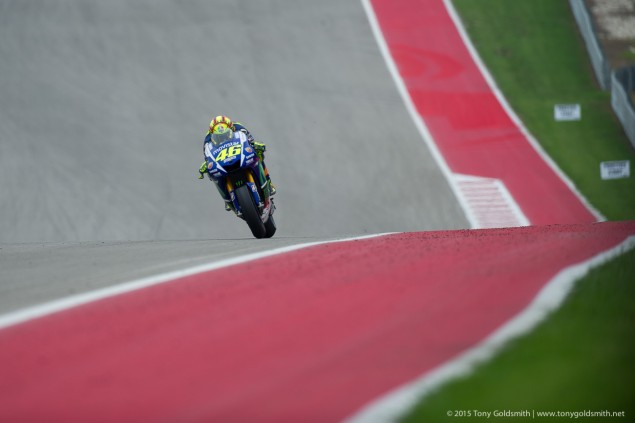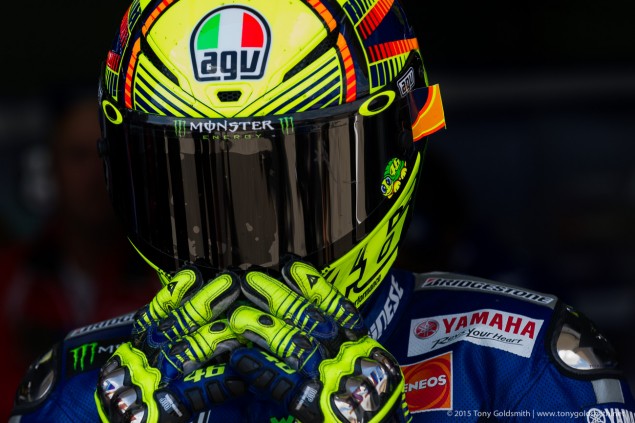Valentino Rossi, Movistar Yamaha, 2nd, 325 points – Score: 9.5
British MotoGP commentator Julian Ryder has one cliché he uses about Valentino Rossi all the time. “Never write Valentino Rossi off.” It may be a cliché, but in 2015, Rossi showed once again why clichés exist.
At the age of 36, he was past his physical prime, and not capable of keeping up at the front. Twenty seasons of top level racing had dulled his desire to compete.
Two seasons at Ducati and a poor return to Yamaha proved he was past his prime. With more money than he will ever need for the rest of his life and a fashion model girlfriend (who rides motorcycles), there was nothing to fire his motivation.
The VR46 racing team was proof Rossi was looking to his retirement, not another championship.
There was at least some truth in all of those statements, voiced by pundits and fans across the world. But they overlooked one crucial fact: you can never, ever, write Valentino Rossi off.
Yes, he was 36, but he is training harder than ever, spending more time at his dirt track ranch built behind his home in Tavullia, and riding a Yamaha R1 around Misano as well.
He paid close attention to the results of the VR46 team, but he did not involve himself directly, concentrating on his own season. The money and the model girlfriend were wonderful, but they could not quench the fire of ambition which still burns inside his chest.
Valentino Rossi is still, at his very core, a racer. His greatest joy is still going faster than anyone else on a motorcycle. 2015 showed that he was still very capable of doing precisely that.
The problem was that his teammate was just that fraction faster. When things went Lorenzo’s way, there was nothing Rossi could do to stop him. What he could do, however, was make sure he finished as close as possible behind Lorenzo, and capitalize when things didn’t go Lorenzo’s way.
Those tactics saw him lead the championship almost to the end, only briefly surrendering the lead on a technicality after Brno, when he and Lorenzo were equal on points.
The way Rossi managed his season proved his critics wrong. He was still competitive, still capable of winning races, and winning a championship. Valentino Rossi was in the process of cementing his claim to be the greatest motorcycle racer of all time.
Until the flyaways, that is. Rossi rode brilliantly at Motegi, extending his lead over Lorenzo and coming second to Dani Pedrosa in exceptionally difficult conditions.
But it took a lot out of him: Rossi got off his bike looking more tired and drained than I have ever seen him, and I have watched almost every race of his career. The constant pressure of holding Lorenzo at bay was starting to take its toll.
The constant implication that Lorenzo was faster than he was, parroted by the media and the rest of the MotoGP grid, was grating on his nerves. Being beaten by not just Lorenzo, but also by Marc Márquez and Andrea Iannone was the final straw.
At Sepang, Rossi cracked. He cracked first by attacking Marc Márquez in the press conference, accusing him of trying to help Lorenzo to win the championship.
He gambled that this would force Márquez to alter his behavior, and race fairly, as Rossi saw it. It was a surprisingly foolish gamble. As one paddock insider who has worked with both Rossi and Márquez said to me, “this was inevitable, the two biggest egos in the paddock were always going to clash some time.”
Márquez’s response was the exact opposite of what Rossi had hoped. Either because Rossi’s accusations had struck a nerve, or because Márquez was entirely innocent of what Rossi accused him of.
The two tangled in the Sepang race. Rossi passed Márquez, Márquez passed Rossi, until eventually, Rossi blew his cool. He slowed through Turn 13, sitting up and pushing Márquez wide.
He had stopped racing, and was trying to teach Márquez a lesson. The two came together, Márquez fell, and Rossi was handed a penalty, which saw him forced to start from the back of the grid at Valencia.
With a seven-point lead over Lorenzo, Rossi suddenly needed help to be champion. He needed help from the two Repsol Hondas, both of whom had to beat Lorenzo to stop him from getting enough points to take the title.
Márquez followed Lorenzo, clearly at the limit, but not passing when he had the opportunity. He was waiting until the last couple of laps, Márquez said, as he had at Indianapolis.
A reasonable tactic, given that there was only one place on the track where Márquez was faster, Lorenzo’s Yamaha was faster out of the final corner, meaning that Márquez’s only chance was on the final lap. But Dani Pedrosa arrived, slowed Márquez up, and stopped him from attacking.
Again, Rossi saw nothing but conspiracy, a “biscotto”, Italian for an ice cream sandwich, a slang term for when two teams work together against a third. Rossi once again attacked Márquez, denigrating Lorenzo’s title in the process. It was an embarrassment to MotoGP and the sport, he said. Harsh words indeed.
For the first sixteen races of 2015, Valentino Rossi behaved like the mighty champion he is. He fought like a lion when he could, and like a fox when he had to, using every trick he had picked up over his twenty years in the Grand Prix paddock to his advantage. He showed himself to be a more than deserving champion.
In the last two races of 2015, Rossi crumbled. Whether his accusations have any truth to them or not – Occam’s razor says we should take the facts at face value, not succumb to wild conspiracy theories – it was the way he acted on his suspicions that lost him the 2015 title.
If he had not attacked Márquez in the Sepang press conference, the clash at Sepang may never have happened. If he hadn’t responded so fiercely to Márquez’s passes at Sepang – Márquez may have passed Rossi nine times in two laps, but Rossi passed Márquez back the same number of times – he would not have got drawn into losing his cool and forcing Márquez to crash.
He would have started closer to the front of the grid at Valencia, and had a fighting chance of finishing close enough to Lorenzo to take the title.
Sepang and Valencia are a black mark against Rossi’s 2015 season, but they should not overshadow his incredible achievements of this year.
To lose the championship by five points may be bitterly disappointing, but to even be in that position at his age, after so many years at the top, is a mark of just how great a rider Rossi is. He will be back again in 2016. And you can never, ever, write Valentino Rossi off.
Photo: © 2015 Tony Goldsmith / www.tonygoldsmith.net – All Rights Reserved
This article was originally published on MotoMatters, and is republished here on Asphalt & Rubber with permission by the author.


















































































































Comments